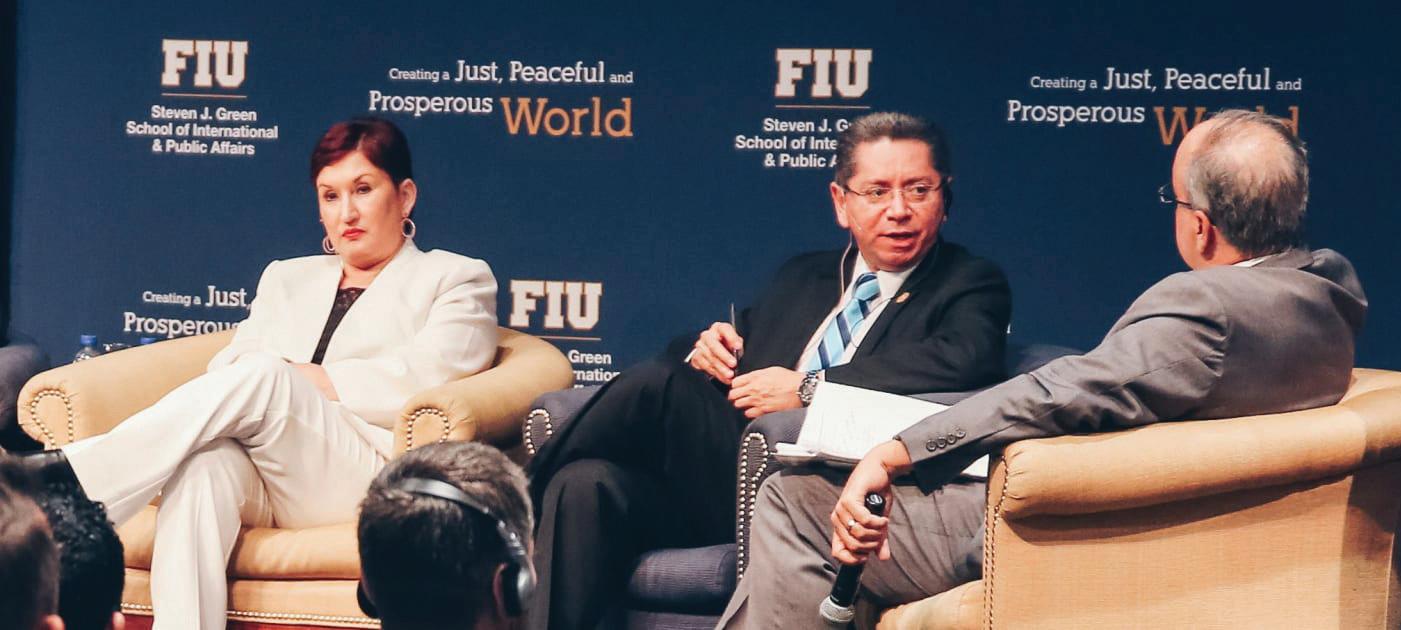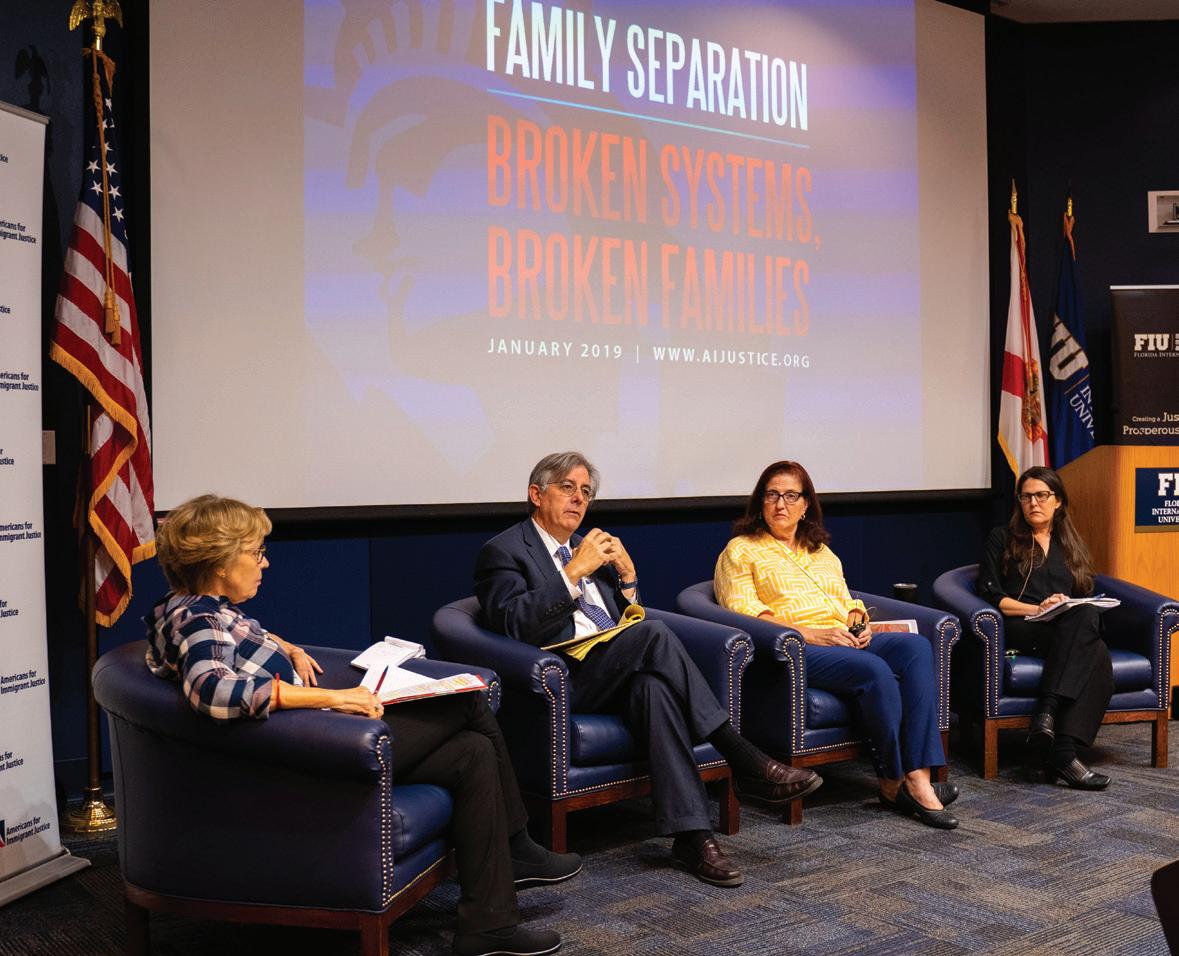
8 minute read
Senior Fellow
Former attorney general of El Salvador joins FIU as senior fellow
The former attorney general of El Salvador, whose high-level corruption cases put a former president, a judge and his own predecessor behind bars, joined the Steven J. Green School of International & Public Affairs as a senior fellow.
Credited with strengthening the rule of law in a country besieged by powerful gangs and corrupt government and military officials, career prosecutor Douglas Meléndez Ruíz led a series of workshops and capacity-building programs on justice reform and anti-corruption at FIU and in Central America.
Supported by a grant from the Howard G. Buffett Foundation, Meléndez Ruíz worked with LACC and the Center for the Administration of Justice, both part of the Green School. Meléndez Ruíz arrived at FIU in summer 2019 and began leading workshops on anti-corruption and justice reform in the fall.
“We very much look forward to having Attorney General Meléndez Ruíz engage our students and faculty on one of the key challenges facing the Americas,” said Frank Mora, former director of the Kimberly Green Latin American and Caribbean Center, where Meléndez Ruíz is based.
Senior fellows at the Green School devote their time at FIU to research, teaching and the creation of new engagement opportunities for students. Previous fellows include Manny Diaz, former mayor of Miami, and Kimberly Green, president of the Green Family Foundation. Current fellows include David J. Kramer, former assistant secretary of state for democracy, human rights and labor under President George W. Bush.
Meléndez Ruíz’s anti-corruption work brought him death threats and criticism from politicians on all sides. Late last year, El Salvador’s legislative assembly denied him a second term, appointing a candidate backed by right-wing party leaders. Despite powerful critics from the left, Meléndez Ruíz maintained both sides had accused him of bias.
Speaking at the Woodrow Wilson Center in Washington, D.C., last year, Meléndez Ruíz said it is essential for civil societies to stand up to corruption in all forms:
“It seems that in some countries, and in El Salvador, the most complicated thing is not to investigate the criminals. The most complicated thing is to fight against the [corrupt] system that you have,’’ he said. “Corruption has no ideology. It is indifferent to any ideology. We have found people linked to corruption from the right and from the left.”
Former attorney general for El Salvador, Douglas Meléndez Ruíz, center, speaks at an event at FIU in October 2017, along with Attorney General of Guatemala Thelma Aldana Hernandez, and Frank Mora, director of the Kimberly Green Latin American and Caribbean Center.
Panelists Cheryl Little, Juan Carlos Gómez, Martha Vallejo and Michelle Marie Ortiz discuss the effects of immigration policies on family separation.

Assessing the impact of the family separation crisis
For more than two decades, Americans for Immigrant Justice (AI Justice) has fought for the rights of immigrant children who arrive to the United States alone, by providing free legal help and a better life. When immigration policies dominated headlines during the summer of 2017, the nonprofit law firm faced one of its biggest challenges: the family separation crisis. A panel of leading experts and practitioners in immigration law and trauma joined the Green School to discuss the impact of immigration policies through shocking statistics and heartbreaking testimonies featured in the latest report by AI Justice, “Family Separation: Broken Systems, Broken Families.” The panel included Cheryl Little, co-founder and executive director of AI Justice; Michelle Marie Ortiz, deputy director of AI Justice; Martha Vallejo; a licensed clinical social worker and psychotherapist; and Juan Carlos Gómez, director of FIU College of Law’s Carlos A. Costa Immigration and Human Rights Clinic. The reports affirm that in the last few years, families that have presented themselves at official ports of entry have been turned away, or told that border patrol’s daily quotas have already been met. Little explained the government’s “zero tolerance” policy, announcing that all families crossing the border without inspection should not only be separated, but also charged with a misdemeanor in federal court. With no plan for reunification, children were sent to shelters scattered throughout the United States, while their parents were detained and awaited their court appearance.
International security experts discuss efforts to fight financial crime in Latin America
When Kenneth A. Blanco first visited FIU in 2017 it was to talk about his role in a massive anti-gang operation in Central America’s Northern Triangle. Blanco, a former Miami prosecutor, led a highly coordinated regional effort that resulted in the arrest of nearly 4,000 gang members in Central America and the United States. It was all in a day’s work for Blanco, then the acting assistant attorney general for the criminal division of the U.S. Department of Justice. Now, as head of the financial crimes unit of the U.S. Department of the Treasury, Blanco is still fighting transnational crime – but this time he is following the money. It’s a trail that can lead law enforcement to drug traffickers, corrupt government officials, human traffickers – even international terrorists.
Kenneth Blanco, left, head of the financial crimes unit of the U.S. Department of the Treasury, listens as Brian Fonseca, director of the Jack D. Gordon Institute for Public Policy, speaks during an event on financial crimes in Latin America.

“Money crosses borders and it jumps jurisdictions and that’s why it’s critical that we follow the trail and connect the dots,’’ said Blanco, director of the Financial Crimes Enforcement Network, commonly known as FinCEN, which was made a Treasury bureau under the U.S. Patriot Act in 2001. “Our work takes us all over the world and all over the world’s financial sectors. It’s a national security issue, and it is not easy.’’ Blanco was recently in Miami to meet with the heads of 23 financial intelligence units from throughout the Americas to improve transnational efforts to fight money laundering, terrorist financing and other financial crimes. Following their closed-door meetings at FIU, Blanco joined his counterparts from Argentina and Canada for a conversation on the issue with students and faculty. The event was a presentation of the Dorothea Green Lecture Series and co-sponsored by the Green School and the Jack D. Gordon Institute for Public Policy.
Technology summit spotlights changing face of intelligence workforce
New America Senior Fellow Peter W. Singer has been described in the Wall Street Journal as “the premier futurist in the national security environment.” He is considered one of the most influential voices in the world on cybersecurity. And he likes what he sees happening at FIU around the future of technology – and its impact on U.S. intelligence and national security. “There is an energy around these topics at this university and it is very exciting,’’ said Singer, who spoke at FIU’s first annual Critical Technology and Intelligence Summit hosted by the Jack D. Gordon Institute for Public Policy, a part of the Steven J. Green School of International & Public Affairs.
“It’s happening at multiple levels,’’ Singer explained. “You’re adding new programs in cyber that are taking off, you’re leaning into AI (artificial intelligence) and you’ve got energy within the Green School and the Gordon Institute to have a real impact.” “You also have a group of students – the intelligence fellows – who are Peter W. Singer spoke at FIU incredibly engaged.” on the weaponization of social media and other trends. Many of those intelligence fellows – enrolled in the Gordon Institute’s Intelligence Community Center for Academic Excellence (IC-CAE) program – lined up to speak to Singer after his talk Sept. 17. This year, the IC-CAE program – specifically created to help prepare tomorrow’s intelligence community workforce - celebrates its 14th anniversary. “I cannot think of a topic more pressing and needed than what we are doing here today,’’ said John F. Stack Jr., founding dean of the Green School and director of the Gordon Institute when the intelligence fellows program was created.
“It is so critical for academic institutions to work with partners like the CIA, NSA, the U.S. Army and other intelligence community agencies to ensure the proper cultivation of our nation’s national security workforce.’’
Security officials assess hemispheric challenges, solutions
Admiral Craig Faller, head of U.S. Southern Command, speaks with Frank Mora, former director of the Kimberly Green Latin American and Caribbean Center, during the 4th annual Hemispheric Security Conference.

Top minds in regional security issues gathered at FIU for the fourth annual Hemispheric Security Conference to discuss how to combat some of the most pressing threats facing the Western Hemisphere. The forum – hosted by the Jack D. Gordon Institute for Public Policy and the Kimberly Green Latin American and Caribbean Center (LACC), both under the Steven J. Green School of International & Public Affairs – featured academics, policymakers, senior military officials, former ambassadors, as well as FIU faculty and students. The Green School’s founding dean John F. Stack Jr. kicked off the conference sending a message of hope to the Venezuelan people. “The situation in Venezuela is dire and the impacts of the political and humanitarian crisis extend well beyond Venezuela,” he said. “FIU is committed to offering such venues to the open discussion of Venezuela’s future, and indeed, the future of the hemisphere.” The opening keynote speaker, Admiral Craig Faller, head of U.S. Southern Command, highlighted the importance of strategic partnerships and a peaceful neighborhood in the Western hemisphere. As a frequent forum for dialogue on critical global issues, FIU is a logical place to host a discussion on hemispheric security, said Brian Fonseca, director of the Gordon Institute, who co-founded the conference with LACC Director Frank Mora in 2016, with funding support from the U.S. Department of Defense. “Educating citizens on the threats to security and governance in the region was an important theme throughout the conference, and FIU’s geographic proximity to both Washington, D.C., and the region makes it a perfect venue for advancing the understanding of the evolving and complex political and security landscapes,” he said.










